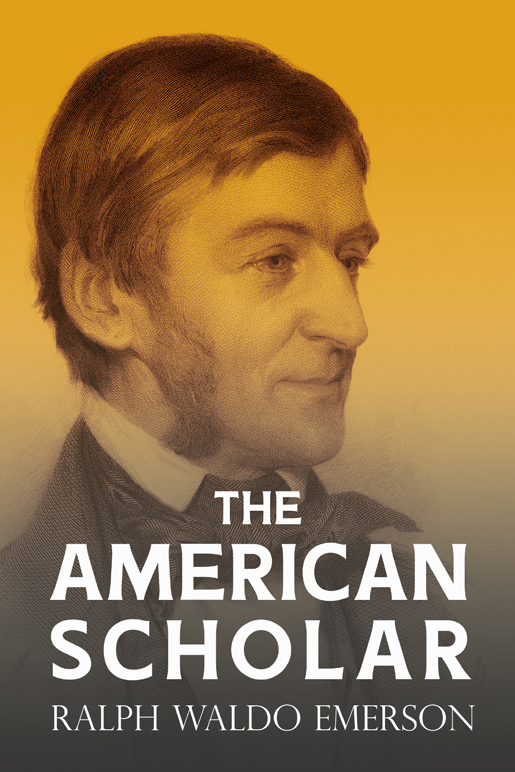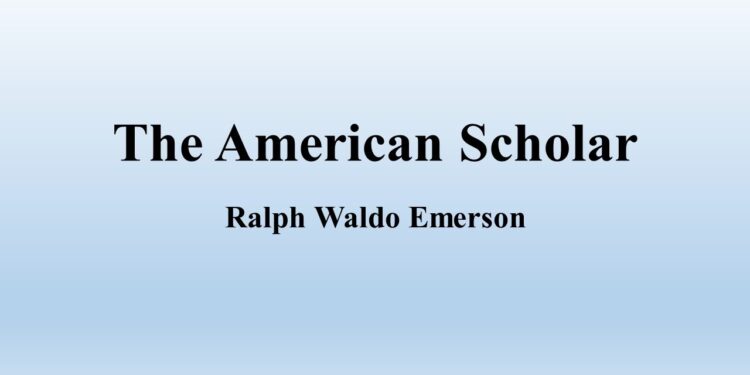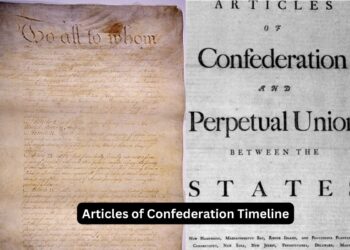Table of Contents
ToggleIntroduction
The American Scholar Summary By Ralph Waldo Emerson “The American Scholar” is one of Ralph Waldo Emerson’s most notable speeches, delivered before the Phi Beta Kappa Society at Harvard University on August 31, 1837. In this address, Emerson calls for intellectual independence, urging Americans to create a distinct cultural identity rather than merely imitating European thought and traditions. He asserts that scholars should engage with the world around them and reflect on its realities, rather than retreat into abstract theorizing.
Emerson’s speech is a call to arms for intellectuals to break away from European cultural dominance and embrace a uniquely American identity. His words suggest that the scholar must combine a love of nature, the study of history, and a commitment to personal experience to truly contribute to society.
Summary of “The American Scholar”
Ralph Waldo Emerson begins his speech by addressing the idea of the American scholar as an individual who should take pride in being part of the new world. He suggests that scholars have, for too long, looked to Europe for inspiration, modeling themselves after the intellectual traditions and cultures of the past. Emerson argues that it is time for America to cultivate its own intellectual resources and establish its own cultural and philosophical identity.
Emerson begins by describing three influences that shape a scholar: nature, books, and action. The scholar, he says, should find a balance between these three elements. Nature, according to Emerson, is the purest source of knowledge. It offers lessons in self-reliance and wisdom, and by immersing oneself in nature, one can learn to trust one’s own thoughts and instincts. Nature teaches individuals about their place in the world and connects them to the broader universe.
Books, while important, must not be worshiped as ultimate authority. Emerson acknowledges that books are a great source of knowledge, but he criticizes the over-reliance on them. He believes that too much emphasis on books limits the mind’s capacity to think independently and critically. Instead, the scholar should engage with books only after first developing a strong sense of self and independent thought. Books should be used as tools for further refinement of one’s ideas, rather than as crutches that hinder innovation.
Read more
Finally, action is the third element that Emerson identifies as essential to the scholar’s development. Knowledge is only valuable when it is put to use in the world. He argues that it is not enough to read or think; the scholar must also act. This action does not necessarily mean physical labor or political engagement but could be any form of creative or intellectual work that reflects the scholar’s understanding and vision.
Through these three pillars—nature, books, and action—Emerson calls on scholars to engage with the world around them, cultivate their own intellectual capacities, and avoid blindly following established traditions. He stresses that scholars should not only engage in abstract thought but also contribute to the well-being of society by applying their knowledge in meaningful ways.
Emerson also speaks to the broader implications of American intellectual independence. He suggests that America, as a nation, is at a crossroads. Having gained independence from Europe politically, it is now time for the American mind to break free of European cultural and intellectual dominance. He urges scholars to embrace their roles as the harbingers of this new intellectual era. America, he argues, has the potential to become a great and original intellectual force, but only if its scholars shed the shackles of European influence.
At the heart of Emerson’s message is the idea that intellectual independence and originality are vital to the progress of both the individual and society. He urges his audience to trust their own instincts, to be self-reliant, and to push the boundaries of intellectual thought. A scholar, in Emerson’s view, should not be a mere imitator of past thinkers but a creator of new ideas that reflect the unique experiences of the American people.The American Scholar Summary By Ralph Waldo Emerson

Themes in “The American Scholar”
1. Self-Reliance and Individualism
A recurring theme in Emerson’s work is the importance of self-reliance and individuality. In “The American Scholar,” Emerson encourages scholars to trust their own minds and instincts. He criticizes the dependence on traditional sources of knowledge and stresses that true intellectual greatness comes from within. The scholar must learn to think independently, without being constrained by the opinions of others.The American Scholar Summary By Ralph Waldo Emerson
This theme of self-reliance is also connected to the broader transcendentalist movement, which emphasized the importance of intuition and personal experience over external authorities. Emerson believed that individuals should follow their own path, rather than conforming to societal expectations or mimicking the thoughts of past generations.
Read more
2. The Role of Nature
Nature is a powerful and constant theme in Emerson’s work. In “The American Scholar,” he argues that nature is an essential source of knowledge and inspiration. By immersing themselves in nature, scholars can develop a deeper understanding of themselves and the world around them. Nature offers a kind of purity that books and human institutions cannot provide, and it serves as a foundation for intellectual and moral development.
Emerson’s view of nature goes beyond its physical beauty; he sees nature as a spiritual and intellectual guide. For him, nature is a reflection of divine order, and by studying it, individuals can come to better understand the divine and their place in the world.The American Scholar Summary By Ralph Waldo Emerson
3. The Danger of Bookishness
Emerson is critical of the over-reliance on books and formal education. While he acknowledges the importance of reading and learning from the past, he warns against the danger of becoming a mere imitator of past thinkers. Scholars should not be slaves to books, nor should they allow themselves to be limited by conventional wisdom. Instead, they should engage with books critically, using them as tools for refining their own thoughts and expanding their minds.
This criticism of bookishness is connected to Emerson’s larger philosophy of intellectual independence. He believes that true intellectual achievement comes from personal experience and active engagement with the world, not from passive consumption of pre-existing ideas.The American Scholar Summary By Ralph Waldo Emerson
4. The Scholar’s Duty to Society
Emerson’s call to action for scholars is another important theme in the essay. He argues that scholars must not isolate themselves in ivory towers but must actively engage with society and contribute to its progress. The scholar’s knowledge and intellectual work should not be purely theoretical but should have a practical application that benefits the community.
This theme is closely related to Emerson’s belief in the importance of action. He asserts that knowledge is not valuable unless it is put into practice, and that the scholar’s ultimate responsibility is to help shape the world for the better. This theme is a call for intellectuals to take on leadership roles and contribute to the moral and intellectual development of society.

5. The Creation of an American Intellectual Tradition
At the core of Emerson’s message is the idea that America must cultivate its own intellectual and cultural identity, free from European influence. He urges scholars to embrace their unique position in the world and to develop new ideas that reflect the American experience. This theme is tied to Emerson’s broader vision of American exceptionalism, in which he sees the potential for the country to lead in intellectual and philosophical thought.
Emerson’s emphasis on the creation of an American intellectual tradition reflects the broader cultural climate of the 19th century, when the United States was striving to assert its independence not only politically but also culturally and intellectually.The American Scholar Summary By Ralph Waldo Emerson
Read more
FAQ
1. What is the central message of “The American Scholar”?
The central message of Emerson’s speech is a call for intellectual independence and originality. He urges American scholars to break free from the influence of European thought and to create their own intellectual traditions. Emerson advocates for a balanced engagement with nature, books, and action, emphasizing the importance of self-reliance and active participation in society.The American Scholar Summary By Ralph Waldo Emerson
2. Why does Emerson criticize the over-reliance on books?
Emerson criticizes the over-reliance on books because he believes they can limit intellectual creativity and independence. He argues that scholars should not merely imitate the ideas of past thinkers but should use books as tools for refining their own thoughts. Too much focus on books can prevent scholars from developing their own unique perspectives and stifle their ability to think critically.
3. How does Emerson define the role of nature in intellectual development?
Emerson sees nature as a fundamental source of knowledge and inspiration. He argues that nature offers a purity of wisdom that cannot be found in books or human institutions. By immersing themselves in nature, scholars can develop a deeper understanding of themselves and the world, which in turn enhances their intellectual abilities.The American Scholar Summary By Ralph Waldo Emerson
4. What does Emerson mean by “action,” and why is it important for scholars?
In Emerson’s view, action refers to the application of knowledge in the real world. It is not enough for scholars to merely think or theorize; they must also contribute to society by putting their ideas into practice. Action can take many forms, from creative work to social engagement, and is essential for making intellectual achievements meaningful.The American Scholar Summary By Ralph Waldo Emerson
5. How does “The American Scholar” reflect Emerson’s transcendentalist philosophy?
“The American Scholar” reflects Emerson’s transcendentalist philosophy by emphasizing the importance of individual intuition, self-reliance, and the connection between humans and nature. Emerson argues that scholars should trust their own minds and experiences rather than relying on external authorities. The essay also promotes the idea that intellectual and spiritual growth come from personal engagement with the world.
6. How does Emerson suggest America should establish its own intellectual identity?
Emerson believes that America should establish its intellectual identity by cultivating original ideas that reflect the unique experiences of the American peopleThe American Scholar Summary By Ralph Waldo Emerson
Read more
















